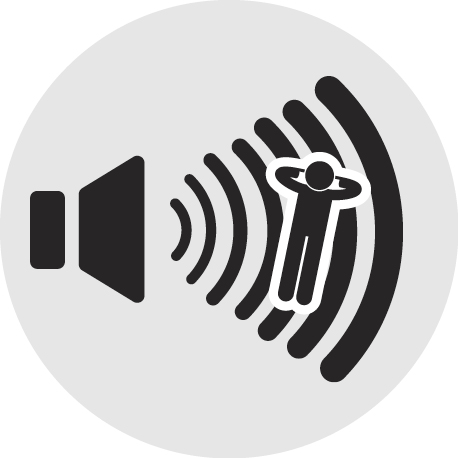
What Would Happen If . . .
You Put on the World’s Loudest Headphones?
WHAT IF YOU put on the world’s loudest pair of headphones and cranked the volume to eleven? Would the death metal rattle your skull and liquefy your brain?
Fortunately, the answer is no. If you put on a pair of 190-decibel headphones, your eardrums would instantly rupture and you would be permanently deaf, but your brain can withstand more energy than music can deliver.
However, the same does not go for some of your other organs. Headphones keep the sound focused on your head where everything but your eardrums is resistant to acoustic energy, but if you unplug the earbuds and listen to speakers you will expose your whole body—and your eardrums are not the only cavity that’s a little vulnerable to sound waves.
Before we get to that, though, it’s important to understand what’s going on when you’re listening to music. Sound is a series of pressure waves moving through the air. You interpret those pressure waves as music because of wiggling bones in your ear that set off a Rube Goldberg–like system between eardrums, membranes, “hairs,” bones, and electrical nerves.
A higher pressure wave of sound equals more wiggling and a louder noise. So sound is actually pressure waves moving through the air, which is why it can cause damage.* The most dangerous sounds are caused by shock waves, which result from major events like bomb blasts where the pressure goes from one atmosphere to many atmospheres in one or more pulses. While these are sounds, they don’t qualify as music because the pressure wave is a single spike, whereas music is an oscillation of pressure. Because the loudest possible oscillation is between 0 and 2 atmospheres; the maximum decibels music can reach is 194. Anything louder would be a shock wave. Therefore the question “Can you be killed by music?” can be translated to “Can you be killed by a sound of less than 195 decibels?” Which begs the question, what is a decibel?
Decibels are used to measure volume and they are logarithmic, which means an increase in 10 decibels equates to a sound with 10 times more energy.
At 120 decibels—equivalent to standing next to a chainsaw—sound begins to get painful.
At 150 decibels you would feel as if you were standing next to a jet engine. The sound would resonate so intensely in your inner ear, it would blow out your eardrum. That would solve the too-loud problem, but if the decibels increase it could still do more damage.
If you released 190 decibels of sound out of speakers you could be in trouble.* Luckily that’s not a practical concern. The loudest man-made speaker is a horn in the Netherlands used to test whether satellites can withstand the noise of a missile launch. The horn produces 154 decibels, which is enough to burst your eardrums but probably not enough to kill you unless you stuck your head in it for a while (scientists aren’t sure because nobody has tried this yet).
Of course, the satellite horn is only the loudest one that we know of.
The U.S. military has experimented with sonic weapons since the 1940s but as far as we know has been frustrated by the results. In concept, the ears make for an inviting target. You can’t close them, turn away, or refuse to pay attention. But in practice sound is difficult to control. It bounces off objects, can be amplified by buildings, and is ineffective for crowd control, where those near the speaker could be instantly deafened while people in the back would barely be annoyed. Perhaps worst of all for the military, a sonic weapon can be countered by a five-dollar set of earplugs.
But let’s say you’re attending a death metal concert, where they have cranked up the speakers to 190 decibels and you have a front-row seat. The sound would immediately blow out your eardrums and leave you permanently deaf, so the noise would not be heard so much as felt.
Sound waves actually compress air as they pass through the atmosphere, but since your body is mostly liquid, it’s almost immune to this compression. We say “almost” because not all of you is liquid. There are some hollow parts, such as your lungs and GI tract, and it’s those hollow spots that you need to be concerned about.
Your intestines, luckily, are tough. It would take more than two atmospheres of pressure to rupture them. To break those open would require the shock wave from an explosion. Your lungs, unfortunately, are far more delicate.
Lung tissue is relatively fragile, and extreme sound vibrations could cause a rapid overexpansion and destroy the small alveoli sacs that line your lungs. Alveoli are the key intermediary between your lungs and blood that allow the gas exchange to take place. Without your alveoli, you couldn’t oxygenate your blood and your lungs would be useless.
So if you were standing in front of a speaker listening to death metal and it was turned up to eleven—in this case, 190 decibels—the pressure wave would force your lungs to overexpand and perhaps break your alveoli sacs. You would suffocate while trying to breathe like a fish out of water.
Of course a true metal fan should travel to Venus. In our atmosphere 194 decibels is the upper limit for music, but on the surface of Venus, where the atmosphere is much denser, rock music can be ten thousand times more powerful. Listening to a guitar solo would be like standing near a bomb blast.